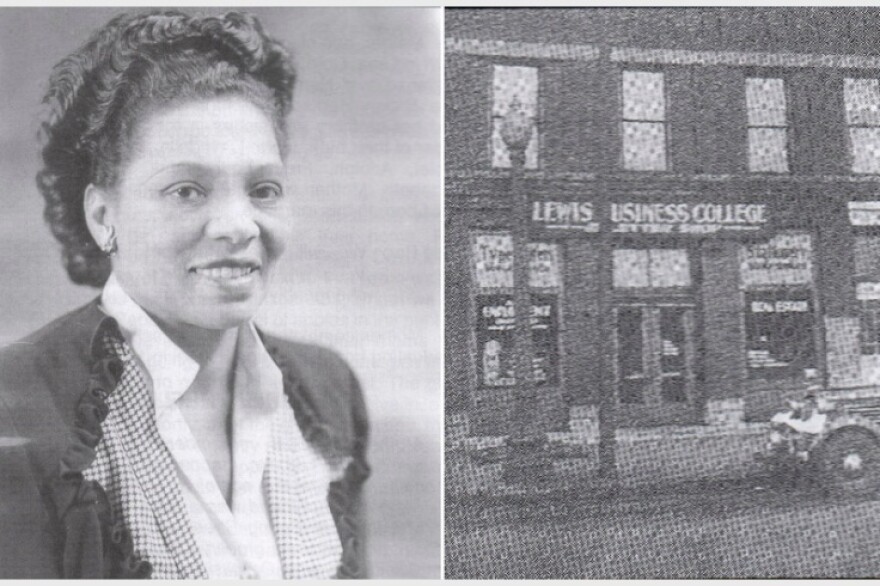Almost 100 years ago, Violet T. Lewis founded what remains Michigan’s first and only historically Black college and university: the Lewis College of Business. The school ceased operations in 2013.
Now, it’s getting a second life, after Designer Brands Inc.—the parent company of Designer Shoe Warehouse — invested $2 million into reopening the school. Now called the Pensole Lewis College of Business & Design, the school is set to reopen in May 2022.
In light of the college’s revival, Jillian Reese spoke with Stateside to remember the life and work of Lewis. Reese is a curator of exhibits with the Michigan History Center.
The story of Lewis’s educational legacy actually begins in Indiana, where she moved after receiving her degree from Wilberforce University in Ohio and working for a time in Selma, Alabama.
“She really liked the atmosphere [in Selma], but she wanted to live closer to family,” Reese said.
After moving to Indiana, Lewis secured a job in the beauty business under Madam C.J. Walker, who was America’s first Black woman millionaire.
Lewis then relocated to a different job, this time at a Black newspaper in Indianapolis. There, she often saw ads for secretarial and clerical work at Indiana businesses—and noticed that the ads were looking to hire out-of-state employees.
“And she looked into why these businesses were not hiring locally, and the mostly African-American business owners told her that they couldn't find qualified individuals in Indianapolis. And after a little more digging, she found out that Indianapolis’ business school would only admit one black student at a time. That was their quota,” Reese explained.
So Violet Lewis got to work.
Her plan was to provide Black Indianapolis residents with a higher-education institution so that they could find employment in the city. She got her project off the ground with the help of a local Black entrepreneur who offered her three months of free rent.
“He did not think that this would really work out for Violet, but he still wanted to champion her because he knew that she was sort of a rock star.”
But after securing a $50 bank loan, which required finding three federal employees to co-sign for her, she opened the Lewis College of Business in 1928. Although its first class totaled just six students — some of whom were family and friends of Lewis—the class size grew exponentially over the college’s first few years.
“She operated for about 10 years—and we should say that it's really incredible that this business continued through the Great Depression, which of course hit all Americans, but Black Americans especially hard,” noted Reese.
Lewis decided to relocate her college after hearing the buzz surrounding “the up and coming, vibrant Black community in Detroit.”
“The Great Migration was bringing thousands of newcomers to the state, and there were also rumblings of World War II. And Detroit's place as the center of manufacturing, eventually known as, you know, the arsenal of democracy, meant new and sort of unprecedented opportunities for Black people, and particularly in professional roles that they did not have access to before World War II.”
After setting up a campus in Detroit, Lewis began to receive complaints from white neighbors, which led to her getting a letter that said she must cease the college’s operations.
“Their complaints were that she was breaking zoning laws, that the neighborhood had been zoned for residential and that for-profit businesses could not operate. But Lewis and the Black community saw this as a smokescreen. They were using zoning laws as a way to evict this Black woman and her business from this area.”
They would not get rid of Lewis so easily. She got a seven-day extension on her eviction, and in that time, went down to Lansing and completed the paperwork to turn her college into a nonprofit.
The Lewis College of Business went on to play a crucial role in the WWII push to get more Black professionals in Michigan’s auto industry.
“She was even tapped by the State Department to go abroad to talk about Black entrepreneurship,” Reese said.
Tragically, Lewis was diagnosed with breast cancer for a second time in the late 60s. She passed away in 1968. After Lewis’ death, her daughters took the reins of the college and kept it operating until 2013.
Although Designer Brands will be putting a new spin on the former Lewis College of Business, Reese believes the Black trailblazer would have been pleased to see its rebirth.
“I think at the end of the day, Violet was someone who did what most entrepreneurs do, which they see a specific issue or problem, and they think creatively about solving that problem. And I think that she would love sort of the rebirth of the Lewis School of Business.”








